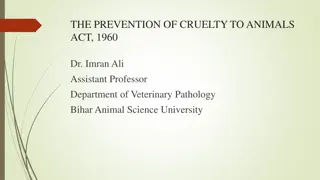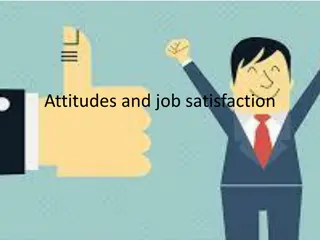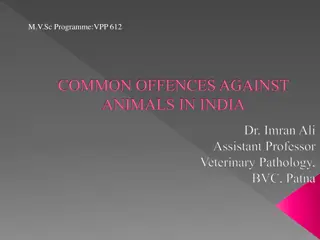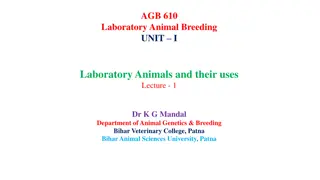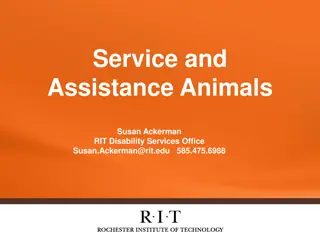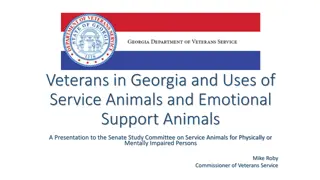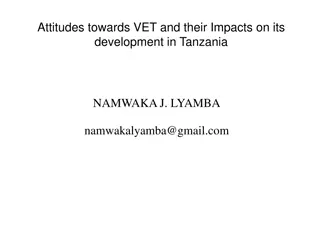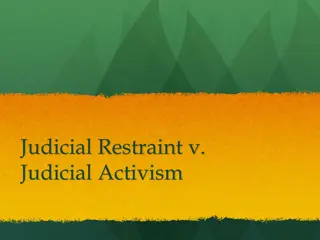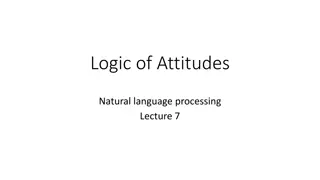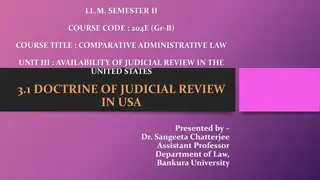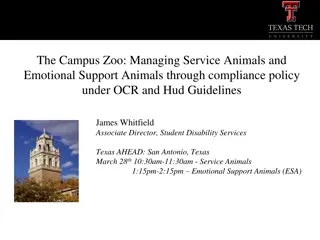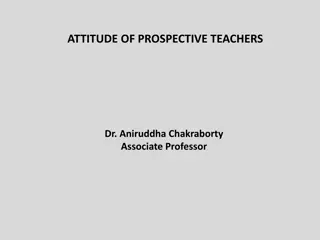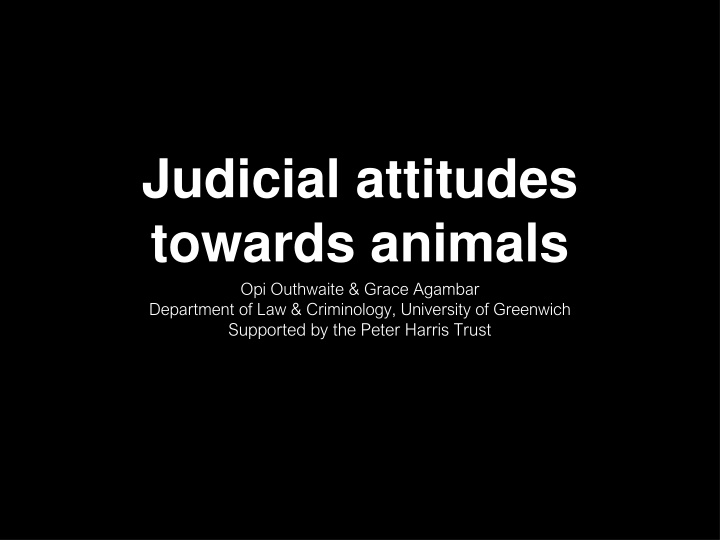
Exploring Judicial Attitudes Towards Animals in Legal Context
The study delves into the judicial attitudes towards animals within the legal framework, highlighting traditional regulatory parameters, emerging threats to the status quo, and drivers for change in law as a discipline. It emphasizes the need to examine judicial decisions in relation to animals and the law, shedding light on implicit biases and accepted truths. The work focuses on recent cases involving nonhuman persons and analyzes the judicial reasoning behind the recognition of legal personhood for animals.
Download Presentation

Please find below an Image/Link to download the presentation.
The content on the website is provided AS IS for your information and personal use only. It may not be sold, licensed, or shared on other websites without obtaining consent from the author. If you encounter any issues during the download, it is possible that the publisher has removed the file from their server.
You are allowed to download the files provided on this website for personal or commercial use, subject to the condition that they are used lawfully. All files are the property of their respective owners.
The content on the website is provided AS IS for your information and personal use only. It may not be sold, licensed, or shared on other websites without obtaining consent from the author.
E N D
Presentation Transcript
Judicial attitudes towards animals Opi Outhwaite & Grace Agambar Department of Law & Criminology, University of Greenwich Supported by the Peter Harris Trust
Law as a discipline Slow to reflect changes in social and moral values Conservative Narrow, problem-solving focus Frequently treated as neutral
Traditional regulatory parameters for animals Animals as property but with permitted protections Law is anthropocentric, separation of man and beast Three prevailing paradigms: Agriculture Welfare (pets) Conservation
Drivers for change Moral, philosophical and scientific drivers: understanding of animal capacities, cognition and agency (responds to place of law in society) Pragmatic drivers: traditional paradigms not adequate to respond to contemporary challenges (responds to law as a practical discipline)
Emerging threats to the status quo Gradual development of legal challenges especially non-human rights cases Focus is the concept of legal persons
Why examine judicial decisions? Very little focus in scholarship on relationship between judges and relationship between animals and the law Judicial activism can shape the law In common law legal systems, judicial decisions are themselves a source of law Judges hand-down a decision - focus will be on express application of law to facts But judicial language and reasoning also reveals implicit biases, accepted truths and implicit assumptions
Our work In progress Initial focus on recent nonhuman persons cases, each sought writ of habeus corpus Analysis of full transcript of hearing
Tommy I Applicants sought writ of habeus corpus: application refused Applicants: law recognised chimpanzees as legal persons for other purposes Judge repeatedly asks about alternative courses of action, repeatedly expressly describes chimpanzees as animals , [purposely?] conflates legal person with human being
Tommy I Before we get to your legal argument on why you think Article 70 applies to a chimpanzee, my question is, is there any other form of redress, i.e., are you claiming -- and I'm assuming you have a claim that he's being mistreated for the sophistication of the animal that he is, a chimpanzee; if that were so, isn't there a different way for you to petition the Court for this relief other than attempting to have the Supreme Court trial level to enlarge the definition of human-being under Article 70 to include an animal, a chimpanzee?
Tommy II Issue on appeal: whether a chimpanzee was a "person" entitled to the rights and protections afforded by the writ of habeas corpus Appeal unsuccessful Focus on notion that rights conferred upon those able to also exercise duties Refers to humans as having unique capacity do so to overcome issue of capacity: attempt to overcome application of law to logical conclusion, rather than an inherent part of the legal concept
Cecilia Applicants sought writ of habeus corpus: application granted State attorney argued ape is not a human person - animals still things under relevant legislation, habeus corpus not available Court focused legal reasoning on constitutional provisions which established basis for protection of a collective good or value and rights to the environment
Cecilia Judge refers to great apes not as animals but as hominids .Cecilia is a member of the community of individuals of our zoo. This because Cecilia is part of the natural patrimony (law 22.421), but also her relation with the human community in my opinion makes her part of the cultural patrimony of the community. Focuses on changes in scientific understanding and on changes in social attitudes - considers animals in the context of the historical development of human rights Draws on precedent disregarded in Tommy concerning historical development of human rights
Preliminary insights Judges appeal to a neutral conception of the law and to particular legal constructs, implies no other possible outcome Further analysis challenges this Legal concepts applied in radically different ways Legal uncertainty might spark change Need for further work - critical [legal] studies



